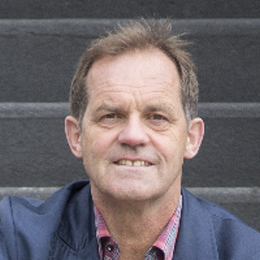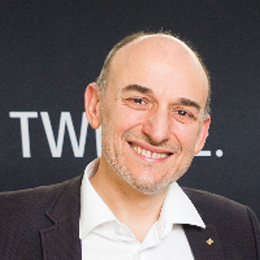Two programs co-coordinated by scientists from the University of Twente have been selected for the second stage of the process for new EU Flagships for Future and Emerging Technologies (FET). The programs are Health EU, which aims to develop personalized human avatars to prevent and cure diseases, and Robotics Flagship, which aims to shape the robots of the future. The projects that will be selected to become FET Flagships at the end of the process will receive one billion euros in funding from the European Commission over a period of ten years.
Albert van den Berg, who co-coordinates the Health EU project together with Adrian Ionescu from EFPL, is proud of reaching the second stage. ‘Passing the first evaluation is an important step forward for the project. We’re not at the finish line yet, but this is an affirmation of the importance of our research at the UT-institutes Mesa+, TechMed Centre and DSI to revolutionize healthcare and provide a better quality of life for Europeans.”
Stefano Stramigioli, who co-coördinates the Robotics Flagship, is also happy about successfully passing the first test. “Robotics is rapidly changing our society, and it is a great opportunity for Europe to make the difference in this. Joining forces on such a large scale would be truly unprecedented. The fact that we’re through to the next round, proves that Europe feels the sense of urgency. It will be exciting to see if we can really form a FET flagship programme.”
Out of 33 applicants, a total of 17 proposals made it through to the second round. In September, these projects will submit a more extensive proposal. Six of these projects will then be selected to compete in the final round to become a FET Flagship.
About the programs
Virtual patients
Health EU is a collaboration between universities and research institutes from all over Europe that aims to build human avatars based on data from biosensors at an unprecedented scale. These personalised avatars will be utilized to prevent and cure diseases. Health EU will exploit most advanced organ-on-chip, smart nanosensor technologies and nanomedicine techniques to realise, validate and use such personalised human avatars in order to create a revolution in healthcare.
The future of robotics
The Robotics Flagship will bring together at an unprecedented scale different research areas to invent the next generation of robots. Developing these intelligent machines with advanced abilities will significantly help addressing European societal challenges. Future robots will have to understand, communicate, and safely blend with humans in unprecedented ways. These capabilities will require a drastic rethinking of robot bodies, minds, and human interaction. To date, over 700 scientists have joined the initiative.







